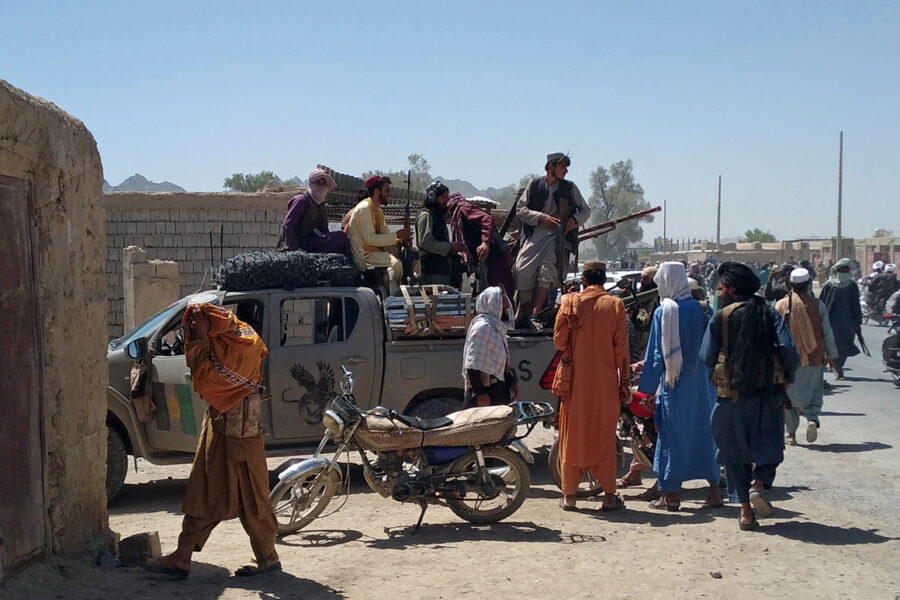Taliban capture major northern city, approach Afghan capital

KABUL, Afghanistan — The Taliban have captured a large, heavily defended city in northern Afghanistan in a major setback for the government, and the insurgents are approaching the capital less than three weeks before the U.S. hopes to complete its troop withdrawal.
The fall of Mazar-e-Sharif, the country’s fourth largest city, which Afghan forces and two powerful former warlords had pledged to defend, hands the insurgents control over all of northern Afghanistan, confining the Western-backed government to the center and east.
Abas Ebrahimzada, a lawmaker from the Balkh province where the city is located, said the national army surrendered first, which prompted pro-government militias and other forces to lose morale and give up in the face of a Taliban onslaught launched earlier Saturday.
Ebrahimzada said Abdul Rashid Dostum and Ata Mohammad Noor, former warlords who command thousands of fighters, had fled the province and their whereabouts were unknown.
The Taliban have made major advances in recent days, including capturing Herat and Kandahar, the country’s second- and third-largest cities. They now control about 20 of Afghanistan’s 34 provinces, leaving the Western-backed government with a smattering of provinces in the center and east, as well as the capital, Kabul.
On Saturday, the Taliban captured all of Logar province, just south of Kabul, and detained local officials, said Hoda Ahmadi, a lawmaker from the province. She said the Taliban have reached the Char Asyab district, just 7 miles south of the capital.
Afghan President Ashraf Ghani had flown to Mazar-e-Sharif on Wednesday to rally the city’s defenses, meeting with several militia commanders, including Dostum and Noor.
On Saturday, Ghani delivered a televised speech, his first public appearance since the recent Taliban gains. He vowed not to give up the “achievements” of the 20 years since the U.S. toppled the Taliban after the 9/11 attacks.
The U.S. has continued holding peace talks between the government and the Taliban in Qatar this week, and the international community has warned that a Taliban government brought about by force would be shunned. But the insurgents appear to have little interest in making concessions as they rack up victories on the battlefield.
“We have started consultations, inside the government with elders and political leaders, representatives of different levels of the community as well as our international allies,” Ghani said. “Soon the results will be shared with you,” he added, without elaborating further.
Insurgents also captured the capital of Paktika, bordering Pakistan, according to Khalid Asad, a lawmaker from the province. He said fighting broke out in Sharana early Saturday but ended after local elders intervened to negotiate a pullout. He said the governor and other officials surrendered and were on their way to Kabul.
Sayed Hussan Gerdezi, a lawmaker from the neighboring Paktia province, said the Taliban seized most of its local capital, Gardez, but that battles with government forces were still underway. The Taliban said they controlled the city.
The Taliban also took control of Maimana, the capital of northern Faryab province, said Fawzia Raoufi, a lawmaker from the province. Maimana had been under siege for a month, and Taliban fighters entered the city days ago. Security forces finally surrendered Saturday, she said.
Tens of thousands of Afghans have fled their homes, with many fearing a return to the Taliban’s oppressive rule. The group had previously governed Afghanistan under a harsh version of Islamic law in which women were forbidden to work or attend school, and could not leave their homes without a male relative accompanying them.
Salima Mazari, one of the few female district governors in the country, expressed fears about a Taliban takeover earlier Saturday in an interview from Mazar-e-Sharif, before it fell to the insurgents.
“There will be no place for women,” said Mazari, who governs a district of 36,000 people near the northern city. “In the provinces controlled by the Taliban, no women exist there anymore, not even in the cities. They are all imprisoned in their homes.”
The withdrawal of foreign troops and the swift collapse of Afghanistan’s own forces — despite hundreds of billions of dollars in U.S. aid over the years — has raised fears the Taliban could return to power or that the country could be shattered by factional fighting, as it was after the Soviet withdrawal in 1989. It’s also prompted many American and Afghan veterans of the conflict to question whether two decades of blood and treasure was worth it.
Afghans have been streaming into Kabul’s international airport in recent days, desperate to fly out, even as more American troops have arrived to help partially evacuate the U.S. Embassy.
The first Marines from a contingent of 3,000 arrived Friday. The rest are expected by Sunday, and their deployment has raised questions about whether the administration will meet its Aug. 31 withdrawal deadline.
Go To Source
Author: POLITICO

